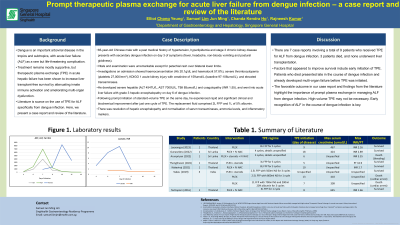Monday Poster Session
Category: Liver
P3123 - Prompt Therapeutic Plasma Exchange for Acute Liver Failure From Dengue Infection – A Case Report and Review of the Literature
Monday, October 28, 2024
10:30 AM - 4:00 PM ET
Location: Exhibit Hall E

Has Audio
- EC
Elliot Y. Chong, MBBS
Singapore General Hospital
Singapore, Singapore
Presenting Author(s)
Elliot Y. Chong, MBBS, Samuel Lim, MBBS, Chanda Ho, MD, MPH, Rajneesh Kumar, MD, MBBS
Singapore General Hospital, Singapore, Singapore
Introduction: Dengue is an important arboviral disease in the tropics and subtropics. Although mild to moderate elevation of liver transaminases is a common phenomenon, dengue infection leading to acute liver failure (ALF) is a rare but life-threatening complication. To date, treatment remains mostly supportive. Therapeutic plasma exchange (TPE) in acute hepatic failure has been shown to increase liver transplant-free survival, attributable to attenuation of innate immune activation and amelioration of multi-organ dysfunction. However, there is scarce literature on the use of TPE for ALF specifically from dengue infection. Here, we present a case report and review of the literature.
Case Description/Methods: A 65-year-old Chinese man presented with secondary dengue infection, with a history of hypertension, hyperlipidaemia, and stage 3 chronic kidney disease. His symptoms included a 3-day history of chills, headache, non-bloody vomiting and postural giddiness. Examination demonstrated petechial rash over the bilateral lower limbs but no other significant finding. Investigations on arrival revealed hemoconcentration (Hb 20.1g/dL and hematocrit 57.8%), severe thrombocytopenia (platelet 27,000/mm³), KDIGO 1 acute kidney injury with creatinine of 1.80 mg/dL (baseline 1.10-1.20mg/dL), and elevated transaminases. He developed severe hepatitis (ALT 4547U/L, AST >7000U/L, Bil 5.00mg/dL) and coagulopathy (INR 1.55), and went into acute liver failure with grade 3 hepatic encephalopathy on day 6 of dengue infection. Following the prompt initiation of standard-volume TPE on the same day, the patient experienced rapid and significant clinical and biochemical improvement after just one cycle of TPE. There was resolution of hepatic encephalopathy and normalisation of serum transaminases, ammonia levels, and inflammatory markers.
Discussion: There are 7 case reports involving a total of 9 adult patients who received TPE for ALF from dengue infection. 3 patients died, and none underwent liver transplantation. Factors that appeared to improve survival include early initiation of TPE and use of high-volume TPE. Patients who died presented late in the course of dengue infection and already developed multi-organ failure before TPE was initiated.
The favourable outcome in our case report and findings from the literature highlight the importance of prompt plasma exchange in managing ALF from dengue infection. High-volume TPE may not be necessary. Early recognition of ALF in the course of dengue infection is key.
Disclosures:
Elliot Y. Chong, MBBS, Samuel Lim, MBBS, Chanda Ho, MD, MPH, Rajneesh Kumar, MD, MBBS. P3123 - Prompt Therapeutic Plasma Exchange for Acute Liver Failure From Dengue Infection – A Case Report and Review of the Literature, ACG 2024 Annual Scientific Meeting Abstracts. Philadelphia, PA: American College of Gastroenterology.
Singapore General Hospital, Singapore, Singapore
Introduction: Dengue is an important arboviral disease in the tropics and subtropics. Although mild to moderate elevation of liver transaminases is a common phenomenon, dengue infection leading to acute liver failure (ALF) is a rare but life-threatening complication. To date, treatment remains mostly supportive. Therapeutic plasma exchange (TPE) in acute hepatic failure has been shown to increase liver transplant-free survival, attributable to attenuation of innate immune activation and amelioration of multi-organ dysfunction. However, there is scarce literature on the use of TPE for ALF specifically from dengue infection. Here, we present a case report and review of the literature.
Case Description/Methods: A 65-year-old Chinese man presented with secondary dengue infection, with a history of hypertension, hyperlipidaemia, and stage 3 chronic kidney disease. His symptoms included a 3-day history of chills, headache, non-bloody vomiting and postural giddiness. Examination demonstrated petechial rash over the bilateral lower limbs but no other significant finding. Investigations on arrival revealed hemoconcentration (Hb 20.1g/dL and hematocrit 57.8%), severe thrombocytopenia (platelet 27,000/mm³), KDIGO 1 acute kidney injury with creatinine of 1.80 mg/dL (baseline 1.10-1.20mg/dL), and elevated transaminases. He developed severe hepatitis (ALT 4547U/L, AST >7000U/L, Bil 5.00mg/dL) and coagulopathy (INR 1.55), and went into acute liver failure with grade 3 hepatic encephalopathy on day 6 of dengue infection. Following the prompt initiation of standard-volume TPE on the same day, the patient experienced rapid and significant clinical and biochemical improvement after just one cycle of TPE. There was resolution of hepatic encephalopathy and normalisation of serum transaminases, ammonia levels, and inflammatory markers.
Discussion: There are 7 case reports involving a total of 9 adult patients who received TPE for ALF from dengue infection. 3 patients died, and none underwent liver transplantation. Factors that appeared to improve survival include early initiation of TPE and use of high-volume TPE. Patients who died presented late in the course of dengue infection and already developed multi-organ failure before TPE was initiated.
The favourable outcome in our case report and findings from the literature highlight the importance of prompt plasma exchange in managing ALF from dengue infection. High-volume TPE may not be necessary. Early recognition of ALF in the course of dengue infection is key.
Disclosures:
Elliot Chong indicated no relevant financial relationships.
Samuel Lim indicated no relevant financial relationships.
Chanda Ho indicated no relevant financial relationships.
Rajneesh Kumar indicated no relevant financial relationships.
Elliot Y. Chong, MBBS, Samuel Lim, MBBS, Chanda Ho, MD, MPH, Rajneesh Kumar, MD, MBBS. P3123 - Prompt Therapeutic Plasma Exchange for Acute Liver Failure From Dengue Infection – A Case Report and Review of the Literature, ACG 2024 Annual Scientific Meeting Abstracts. Philadelphia, PA: American College of Gastroenterology.
